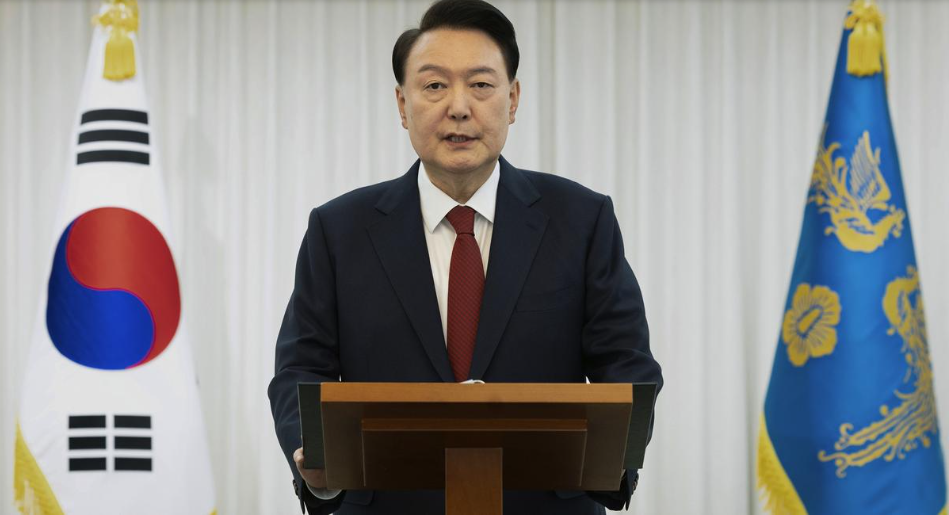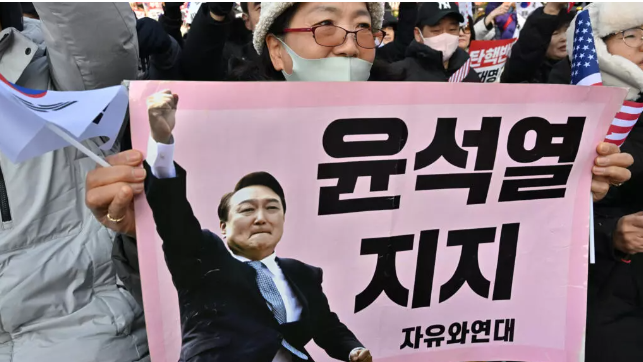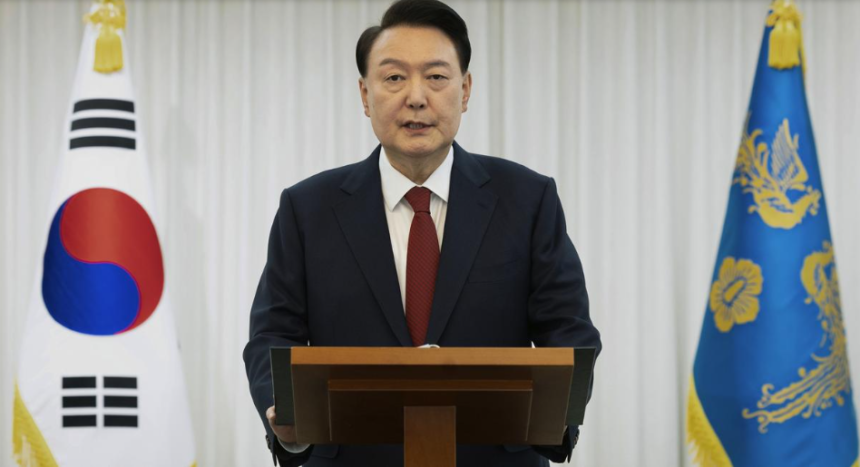South a dramatic turn of events, impeached President, Yoon Suk Yeol, has openly resisted arrest after being accused of plotting to declare martial law to counter opposition against his leadership. Yoon, who continues to rally support among loyalists, vowed to “fight alongside [his supporters] to the very end to protect this nation.” This escalating political crisis has plunged the country into turmoil, deepening divisions and raising critical questions about governance, democracy, and national stability.
This article explores the developments surrounding Yoon Suk Yeol’s resistance to arrest, the accusations against him, the reaction from South Korean society, and the broader implications for the nation’s democracy.
Yoon Suk Yeol: The Center of a Political Storm
Yoon Suk Yeol, a former prosecutor-general turned politician, ascended to the presidency with promises of reform and strong governance. However, his tenure has been marred by controversies, including allegations of authoritarian overreach and corruption, leading to his impeachment.  For the more information click on this link
For the more information click on this link
The Martial Law Allegations
Yoon is accused of devising a plan to declare martial law during heightened political unrest following mass protests against his administration. Key elements of the allegations include:
- Mobilizing the Military: Leaked documents purportedly suggest discussions to deploy armed forces to suppress dissent.
- Suspending Constitutional Rights: The plan allegedly included restrictions on freedom of assembly, speech, and media.
- Securing Power Illegally: Critics argue that the martial law bid was aimed at consolidating power despite growing public discontent.
His Statement of Defiance
In a fiery public statement, Yoon declared, “I vow to fight alongside you to the very end to protect this nation,” framing the charges as a politically motivated attack. His rhetoric has fueled tensions, with supporters viewing him as a patriot under siege and detractors branding him a threat to democracy.
The Resistance: Refusing Arrest
Authorities issued an arrest warrant for Yoon Suk Yeol following credible evidence of his alleged plans. Despite calls to surrender, Yoon has fortified himself in his private residence, surrounded by loyalists and invoking the support of military veterans and conservative groups.
Tactics of Resistance
- Gathering Supporters: Hundreds of loyalists have formed a human barricade around Yoon’s residence, chanting slogans against his arrest.
- Challenging Legitimacy: His legal team has filed petitions questioning the warrant’s validity and accusing prosecutors of bias.
- Media Engagement: Through carefully crafted statements and interviews, Yoon has sought to sway public opinion in his favor.
Public and Political Reactions
Yoon’s resistance to arrest has divided South Korean society and triggered intense debates about justice, democracy, and political accountability.
Supporters’ Perspective
- Narrative of Patriotism: Yoon’s allies argue that his actions were intended to preserve national stability amid chaos.
- Distrust in Judiciary: They accuse the legal system of partisanship, aligning with progressive forces seeking to dismantle conservative leadership.
- Mass Protests: Demonstrations in favor of Yoon have erupted in several cities, with his supporters accusing the government of persecuting him for political gain.
Opposition Viewpoint
- Threat to Democracy: Critics contend that Yoon’s martial law bid exemplifies authoritarian tendencies, undermining South Korea’s democratic principles.
- Demand for Accountability: Calls for his arrest have intensified, with opposition leaders urging swift legal action to uphold justice.
- Wider Implications: Yoon’s actions have been described as dangerous precedents that risk eroding public trust in democratic institutions.
Legal and Constitutional Ramifications
Yoon Suk Yeol’s case represents a constitutional conundrum for South Korea, posing challenges for the judiciary and law enforcement.
Implications of Martial Law Accusations
- Violation of Civil Liberties: If proven, Yoon’s plans would contravene South Korea’s Constitution, which guarantees fundamental rights even during crises.
- Legal Precedents: The case may set far-reaching legal standards for addressing unlawful attempts to subvert democracy.
- Political Precedent: It highlights the vulnerability of the nation’s democratic framework to exploitation by high-ranking officials.
Judicial Dilemma
Courts must navigate a highly charged political environment while ensuring impartiality. A failure to uphold due process risks delegitimizing the judicial system.
Global Implications
The turmoil in South Korea has drawn international attention, with implications for its diplomatic and security posture.
Regional Stability
- South Korea’s political upheaval could create uncertainty in its engagements with North Korea and neighboring powers like China and Japan.
- The nation’s ability to maintain cohesion amid escalating geopolitical challenges, including tensions on the Korean Peninsula, is crucial.
Perception of Democratic Values
- South Korea, often hailed as a beacon of democracy in Asia, risks tarnishing its image if allegations of martial law are substantiated.
Historical Parallels
South Korea’s history is replete with instances of political leaders wielding extraordinary powers during times of unrest. This crisis evokes memories of:
- The 1980 Gwangju Uprising: Military-backed martial law under President Chun Doo-hwan led to widespread violence and public outcry.
- Park Geun-hye’s Impeachment: The nation’s first female president faced a similarly dramatic removal from office in 2016 over corruption allegations.
Each case underscores the fragility of democratic governance amid political crises.
The Road Ahead: Scenarios and Challenges
Yoon Suk Yeol’s standoff presents a series of possibilities, each laden with challenges for South Korea.
Possible Outcomes:
- Surrender and Trial: Yoon agrees to face trial, paving the way for a legal resolution, though the process may intensify political polarization.
- Continued Resistance: Extended defiance risks escalating public unrest, complicating efforts to maintain order.
- Mediation Attempts: Third-party mediation, possibly by senior political leaders, could broker a solution to prevent violence.
Key Challenges:
- Balancing Justice and Stability: Authorities must ensure that the pursuit of justice does not exacerbate social divisions.
- Rebuilding Trust: Restoring public confidence in democratic processes and governance will require transparency and accountability.
 For the more information click on this link
For the more information click on this link
South Korea’s Democratic Resilience
While the crisis underscores vulnerabilities, it also highlights South Korea’s robust institutional frameworks that allow for legal accountability, even at the highest levels of power.
Lessons Learned
- Vigilance against authoritarian tendencies is vital to safeguarding democracy.
- Active civil society and free media play crucial roles in holding leaders accountable.
Conclusion
The resistance by Yoon Suk Yeol against his arrest over the martial law allegations has become a defining moment in South Korea’s political history. It raises fundamental questions about the balance between leadership and accountability, justice, and stability.
As the nation grapples with this unfolding crisis, the actions of its judiciary, political leaders, and citizens will shape South Korea’s democratic legacy. How the nation responds will determine its ability to reconcile divisions, strengthen institutions, and uphold its commitment to democratic governance in the face of adversity. ALSO READ:-The Debate Over Monitoring Unlawful Internet Content: MHA and States Engage Private Volunteers 2024





